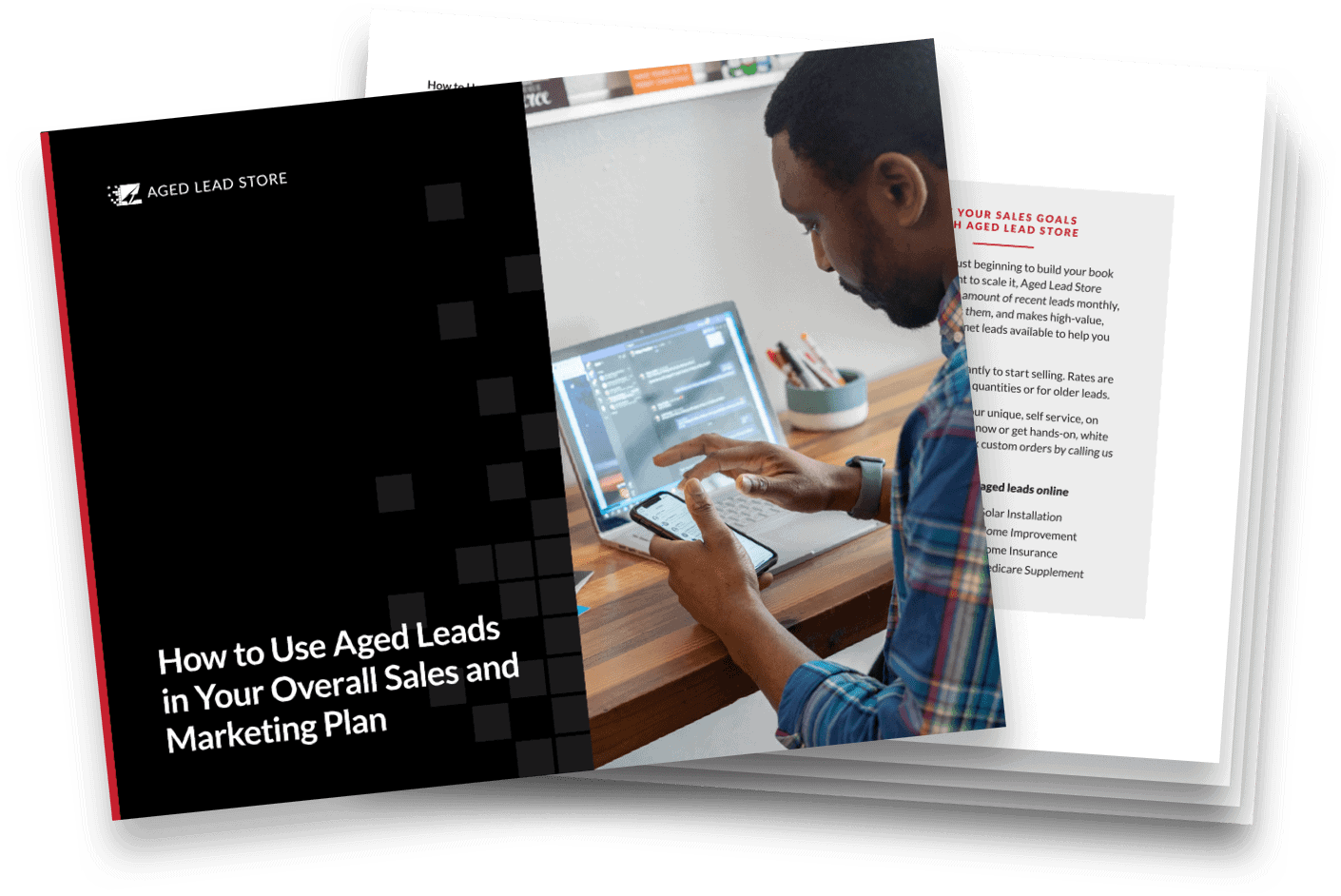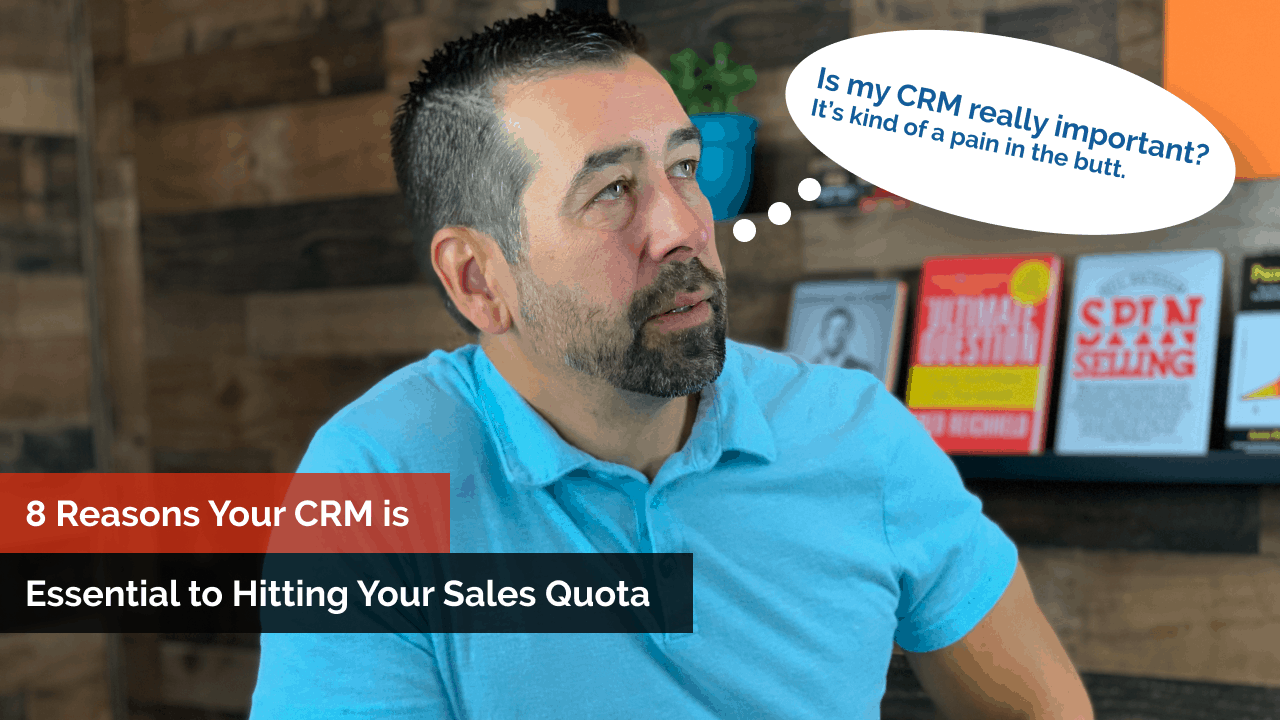All salespeople have a frenemy (a friend mixed with an enemy) that they have a love-hate relationship with. No, it isn’t that one person in the office.
It’s CRMs. CRMs are essentially for managing and building relationships with customers, clients, prospects, and leads, but they can be hard to dive into.
Everyone inherently knows that CRMs are important, but at the same time, they’re usually difficult to use successfully and to get things in there. That along with the fact that data entry is never fun and that many businesses use different types of CRMs, it’s a recipe for annoyance.
However, they’re imperative to hitting your sales quota and improving your sales overall. And while there’s always a learning curve, it’s really important to embrace whatever CRM system you’re using and make it a part of your sales system.
In this post, we’re going over 8 reasons to use your CRM to hit your sales quota every single month.
How Does a CRM Actually Help with Sales?
Remember the days of having to keep all of your contacts in a Rolodex? CRMs, at their core, are modern-day Rolodexes.
They’re a digital database of all of your contacts. It’s where all of the information you’ve collected resides in an organized and digital place.
It’s important to keep this information accessible and organized so we can maintain those relationships with prospects and clients. Studies have shown that we can only have close relationships with about 125 people at a time.
This isn’t an amount anywhere near most people’s sales quotas, so we need to simulate and attempt to maintain many more close relationships that we are able to in order to hit our sales goals. And that’s what a CRM helps us do.
That’s the primary kind of benefit of CRMs: to have that database of contacts. It allows you to have all that information about those relationships at your fingertips so you can deliver a personal and high-quality experience to everyone, even if your contact list is in the thousands.
Now that you know the general way that CRMs tie into sales, let’s get into the list of the top eight reasons why it’s essential to use your CRM to hit your sales quota.
1. CRMs Hold Your Contacts
As we’ve said a few times, the number one reason to use a CRN for sales is to hold all of your contacts in one neat, organized, and accessible place.
Everything should be in there. Names, phone numbers, social media handles, emails, friends, referrals, etc. Try to use one that is easy to manage and use (unlike clunky ones like *ahem* Outlook and Gmail).
Good CRMs give you the ability to load stuff in there. They can also allow you to easily sort through and find people and to generate lists, segments, networks, etc.
This can allow you to create connections, utilize professional and personal relationships to your advantage, like as great referral sources, for example. You’ll often see this as particularly helpful in financial services, mortgage, insurance, and even solar industries.
While you want to see these connections and networks within your CRM, you also want to be able to see everyone’s individual info clearly. It’s really important to be able to segment those into groups, as well, which requires a CRM.
Bottom line: your CRM is your base repository of all your contacts; it’s the source of all your prospects and your leads.
2. Your CRM Documents Your Activity
Forget sacred texts: the CRM is the ultimate source of truth for a salesperson or marketer. It’s the authoritative place you should go to recall things, to remember what you said, to remember what you’ve done with each client, to remember the activities that you’ve gone through, and the like.
It should be the one place that documents all of your sales activity.
This serves to help you remember each client personally and know what your next step is. But it also, very importantly, reinforces you when you’re re-engaging a contact. It’s really hard to reconnect or even remember to reconnect with somebody that you’ve had as a contact over an extended time period whether that means a couple of weeks or months or years later.
Only a CRM is going to be able to provide you that kind of detailed information. Other more basic forms of contact management like an Excel spreadsheet is simply not going to provide the functionality to make you aware of those time frames or that detailed information from the past to re-engage with the prospects in your database.
3. CRMs Keep You Focused on Your Goal
Basic contact management via email or Excel gives you a million ways to get distracted. You might as well check that email right? Or update that productivity spreadsheet? What about that file you were just sent?
Simply using a CRM instead focuses you. A CRM has a specific purpose and gets you in the “sales” mind, so-to-speak. There’s nothing in there except opportunities, contacts, and sales opportunities. This gets you super, super focused on that target: your quota.
Going beyond that, it also allows you to segment, create lists, and those sorts of things that, again, get you even increasingly focused on your goal and task.
And that’s really the key component of CRMs. Make sure that your CRM allows you to create a targeted list that you can drill through. This could be by email, phone, or something else. But just make sure that it gives you a focused list that makes you go into “power hour”.
Every time you open it up, say to yourself, “It’s showtime.” Then, tell yourself you’re going to burn through that list, make as much impact, and create as much activity as possible.
Get Aged Internet Leads
Browse, Filter, and Buy Aged Internet Leads – Instantly!
Browse, Filter, and Buy Aged Internet Leads – Instantly!
4. Automation
CRMs make things streamlined and efficient by automating a large part of your process.
As technology improves, CRMs are getting more and more capable of integrating themselves into all parts of your process.
They can allow you to completely build out a campaign that goes through your whole list, use that same introductory email with some CRM-fueled personalization and a task that would’ve taken a full day can take an hour or even just a few minutes while still maintaining a unique and organic campaign.
Anytime you find something that actually works really well, you can scale that. This could be for text messages, voicemails, emails, Facebook messages, and more. This will take a little bit of work as you’ll have to learn how the technology works and how to use it properly and organically. However, once you do that, you can see huge sales increases and benefits to your process.
5. Helps You See Trends and Patterns
As you start to work with a CRM, you’ll be looking at leads and contacts constantly. You’ll start to identify groups and segments within this large group of contacts.
As you work through all of these groups, contacts, and segments inside of your CRM, you’re going to start to see (in both your activity and in your reporting) trends and patterns. Once you notice these patterns, you can start to leverage things that are working over and over again with certain types of contacts and clients.
This allows you to formulate streamlined and effective tactics and strategies that you can use to make sales.
6. Documents Customer Behaviors
Similar to noticing trends, the sixth benefit of using a CRM is that you’ll begin to both notice and document customer behavior. This includes both preferences and objections to your products and services.
As you’re going through your list, taking notes and jotting down information, you’re going to start to get very robust documentation of things that customers love and don’t love about your product and service. This can have lots of impacts.
Perhaps the most important is that it teaches you how to sell effectively. During your practice, training, role-playing, etc, you now have common and actual objections clients have. Thus, now you know exactly what to prepare for and how to sell in the face of those objections.
Recraft your scripts to emphasize those things that the customers generally love and set up information that lessens their objections. This allows you to refine your sales process.
The other benefit is when you start to see preferences or even objections that consumers have, you can use that documentation inside of your CRM to actually improve and refine the product or service itself. Gather this info and hand it off to your product designers, your servicers, your technical team, or whoever is in charge of the creation/output of the product/service.
Your CRM can help you and your business progress to be the best it can be!
This not only makes it easier for you as a salesperson to actually sell, but it also improves the product for your customers.
Get Aged Internet Leads
Browse, Filter, and Buy Aged Internet Leads – Instantly!
Browse, Filter, and Buy Aged Internet Leads – Instantly!
7. Easily Craft Progress Reports
A sales quota is going to inherently be overseen by a superior. People (including yourself!) are going to want to see the progress and work you’ve done in the sales period.
CRM systems make it super easy to create reports of your progress/activity. This will help you and your sales directors see how effective you are, what your outcomes are, and, of course, whether you’ve hit your quota.
All you have to do is document your activity directly in the CRM as you go. Then, most CRMs allow you to then automatically create a PDF, a spreadsheet, or a presentation that shows the reported activity in an organized and easy-to-read document.
This lets you spend more time selling and less time making sales reports. It’s a win-win.
8. Stocking the Prospect Pond
Last, but not least, is that your CRM creates an amazing stock of all your prospects. It’s an ever-growing stocked pond worth of prospects. You’re going to be adding people and names each month, perhaps even every day. This allows you to begin generating not only prospects but also age leads and even real-time leads.
The initial prospects you throw into the CRM pond are going to be nurtured and matured over time all while you continue to add new prospects to keep things stocked. These can all grow and nurture into solid leads and then full-on clients.
This also is the home of recurring accounts, leads that age and then convert later, and more. Stocking that pond and making that investment into filling your CRM is a huge benefit that will continue to give you sales over months and years.
Questions?
While most people have a love-hate relationship with their CRM, we hope that this showed you it should be all love. Your CRM can help you hit your sales quota each and every month if you can milk the CRM for all it’s worth.
And, trust us, it’s worth a lot.
If you have any questions, don’t hesitate to leave a comment or reach out to us! We’d be happy to get you started on your CRM journey.
Browse, Filter, and Buy Aged Internet Leads – Instantly!














